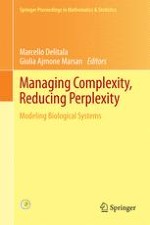2014 | OriginalPaper | Chapter
Quantitative Approaches to Heterogeneity and Growth Variability in Cell Populations
Authors : Priscilla Macansantos, Vito Quaranta
Published in: Managing Complexity, Reducing Perplexity
Publisher: Springer International Publishing
Activate our intelligent search to find suitable subject content or patents.
Select sections of text to find matching patents with Artificial Intelligence. powered by
Select sections of text to find additional relevant content using AI-assisted search. powered by
